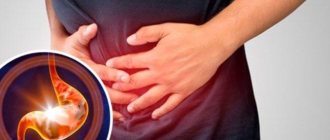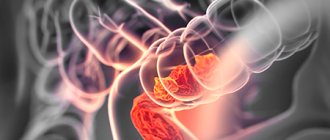Problems in a sensitive area (anus) are often an obstacle to prompt access to a medical facility. False shame, the expectation that everything will go away on its own, self-medication - these negative aspects can significantly worsen the patient’s condition.
Which doctor should I contact for hemorrhoids? Diagnosis, identification of symptoms, and most importantly, treatment of this disease is carried out by a proctologist.
The departments that provide assistance for pathologies in the rectum, colon, and anus are called proctological departments. The most modern term for a doctor in this specialization is coloproctologist.
Changes in terminology are associated with the expansion of the boundaries of the proctological medical field, which includes the diagnosis and treatment of not only the rectum, but also the large intestine.
Symptoms
At stages 1-2, internal hemorrhoids rarely cause any trouble and in most situations proceed hidden. In some cases, patients are disturbed by a feeling of discomfort in the anus, which intensifies after a long stay in a sitting position, as well as a feeling of incomplete bowel movement after defecation in the actual absence of constipation.
As the disease progresses to stages 3-4, more striking symptoms appear:
- itching, burning or constant discomfort in the anus;
- painful bowel movements, with pain persisting for 10-30 minutes after defecation;
- bleeding from the anus (less often - mucous discharge);
- prolapse of hemorrhoids from the anus to the outside.
- anoscopy - to assess the size of hemorrhoids;
- rectoscopy - to detect concomitant diseases;
- colonoscopy - to examine the general condition of the rectum.
Diagnostics
Internal hemorrhoids are easily detected during a digital examination of the anus by a proctologist or surgeon. In some cases, special instrumental research may be required:
Diagnosis of hemorrhoids
An examination by a coloproctologist involves complex procedures, among which it is worth noting an examination of the rectum. Upon examination, external hemorrhoids can be identified, and by carefully spreading the edges of the external anal sphincter, internal nodes can be identified. Using a digital rectal examination, which should be carried out in all cases, except those when there is an exacerbation of the process, it is possible to establish the presence of compacted hemorrhoids, the tone of the anal sphincter, and identify concomitant diseases of the rectum. To establish that hemorrhoids have come out, the patient is asked to strain. The doctor must also perform a sigmoidoscopy. A thorough examination of the patient allows us to exclude anal fissure, paraproctitis, polyps and rectal cancer.
Causes
The main reason for the development of internal forms of hemorrhoids is a violation of the inflow and outflow of blood in the cavernous (cavernous) bodies. In a healthy person, these corpuscles fill with blood when the intestines are filled with feces, which causes them to increase and makes it easier to control the urge to defecate. After successful bowel movement, blood flows out and the cavernous bodies shrink.
If the regulation of outflow is disrupted and the cavernous bodies are constantly in an increased size, then over time this leads to varicose veins and thinning of the venous vessels. The main causes of blood outflow disorders traditionally include the following factors:
How is the examination carried out?
Proctologists treat hemorrhoids. If the district hospital does not have its own specialist, you should first contact a general practitioner, who, after listening to complaints, will give a referral to another medical institution or provide a card for treatment with a gynecologist.
The proctologist's appointment begins with listening to verbal complaints, which will be recorded in the patient's chart. After which the doctor will ask clarifying questions and begin the examination. It is important for him to see whether there are venous lumps outside the rectum, whether there are cracks in the skin, swelling and other signs of incipient hemorrhoids.
If the external examination does not give the doctor a complete picture, he can palpate the rectum, as well as prescribe conoloscopy and other examination methods.
Prescribing treatment does not mean that the patient, having received recommendations, will be able to overcome the disease. Conservative treatment methods require the same careful medical supervision as the recovery period after surgery. Therefore, it is important to visit a proctologist according to the schedule prescribed by him. This way, the doctor will be able to monitor the progress of treatment over time and, if necessary, make changes to the prescribed therapy.
Treatment options
Internal hemorrhoids can be treated conservatively, but only if the disease was detected in the early, almost always asymptomatic, stages. In this case, the patient is prescribed regulation of motor activity, prevention of constipation (diet table No. 3), taking phlebotonic drugs and a course of therapy with rectal antihemorrhoidal suppositories.
If the favorable moment has been missed, only surgical methods will help to cope with the disease:
- 1. Sclerotherapy
: a sclerosing drug is injected into the hemorrhoidal node, causing “gluing” of the walls of the venous vessel and its gradual resorption. Effective for the treatment of stage 1-2 hemorrhoids. At stages 3-4 of the disease, the procedure helps reduce the size of the nodes.
2. Laser vaporization
: The hemorrhoid is removed using heat from a laser beam. Effective for the treatment of stage 1-3 hemorrhoids. At stage 4, vaporization is practically useless.
3. Hemorrhoidectomy
: direct removal of hemorrhoids using a scalpel or electric knife. It is used at the 4th stage when hemorrhoids prolapse outward.
4. Removal using the Surgitron device
: The hemorrhoid is removed with a narrow beam of high-frequency radio waves. Like hemorrhoidectomy, it is indicated for prolapsed nodes.
Latex ligation for the treatment of internal hemorrhoids, as a rule, is not used due to the low effectiveness of this method in combating advanced forms of the disease - that is, when the internal node falls out.
What awaits you at your appointment with a proctologist?
The diagnostic procedures awaiting you in the doctor's office can hardly be called pleasant. However, when identifying hemorrhoids, what doctor can do without palpation of the anus, which helps to feel the inflamed nodes?
A specialist will also be able to obtain a visible picture of the disease using anoscopy - a procedure for examining the rectum using a special mirror instrument.
The most complete and informative way to diagnose hemorrhoids for the attending physician has been and remains sigmoidoscopy. A special tube with a lighting element expands the opening of the rectum by supplying air, then, using magnifying optics, allows you to examine the rectal mucosa.
Only after collecting a primary medical history and receiving the results of the above studies, the doctor prescribes treatment for hemorrhoids, taking into account the individual characteristics of the patient’s body.
Clinical prognosis
The overall clinical prognosis is always favorable. Modern proctological methods make it possible to successfully treat internal hemorrhoids even at the most advanced stages.
The disease can pose a threat to life only if the hemorrhoids become necrotized with the addition of blood poisoning, but this is only possible in the case of a long, persistent and conscious refusal of the patient to receive medical care.
Surgeon-coloproctologist, surgeon of the highest category. Rakhmatullin Andrey Albertovich
Why self-medication is unacceptable
There are no folk methods or harmless procedures that, as part of self-medication, could effectively help with the occurrence of hemorrhoid symptoms. If the patient takes a responsible approach to the issue of his health and seeks help at the first manifestations of the problem, it is possible to stop the development of the disease using conservative methods. Drugs that prevent the formation of blood clots and increase the rheological properties of blood will relieve inflammation in the lower parts of the hemorrhoidal vein.
Dosage forms for topical use in the form of a cream or ointment will help relieve pain at the initial stage. Some are aimed at constricting blood vessels and relieving swelling, while others contain lidocaine, which relieves the sensitivity of the inflamed area. You should not buy such drugs on your own, as they are selected individually, depending on the clinical picture. And the presence of an anesthetic is a direct contraindication for some patients, since not everyone can tolerate lidocaine. The longer a patient waits to see a doctor, the higher the likelihood of disease progression. This means that a delayed visit to a specialist will result in a surgical operation.
How to prepare for an examination
The date for the examination of hemorrhoids for the patient is determined by the specialist. The doctor tells the patient in advance about the necessary preparation that will be needed to obtain the most accurate data:
- a few hours before the examination you must refuse food. The patient is advised to have dinner, but the next day to come to the doctor on an empty stomach;
- the day before, it is not recommended to eat foods that cause fermentation processes in the intestines; you should avoid cabbage, legumes, grapes, mushrooms, raisins and other dishes;
- Before the diagnosis, it is recommended to take a laxative and give a cleansing enema.
Before going to the hospital, a person is recommended to take with him a towel, gown, change of shoes, or purchase a special examination kit at the pharmacy. Simple preparation will help you make a diagnosis, select appropriate therapy, and quickly begin to treat the pathology.
Responsibilities of a coloproctologist surgeon
A coloproctologist-surgeon not only treats hemorrhoids, but also eliminates intestinal pathologies due to injuries and congenital diseases.
The doctor provides emergency or planned care if:
- hemorrhoids with complications;
- rectal fissures;
- intestinal polyps;
- paraproctitis;
- cysts and tumors.
The doctor’s task is to choose an effective treatment method, taking into account the diagnostic results and the general health of the patient. The choice of surgical intervention method is based on the relationship between the level of risk and predicting the development of the disease. The coloproctologist explains to the patient how to prepare for surgery, removes structures, eliminates cracks, and restores intestinal functionality. After the operation, a diet, dressings, local procedures, and medications are prescribed.
The responsibilities of a doctor in this specialization, in addition to seeing patients, include maintaining documentation, analyzing the effectiveness of his work, and improving his qualifications every 5 years. During retraining courses, the doctor gains knowledge about new therapeutic advances and drugs, and the capabilities of innovative diagnostic equipment.
The doctor who treats hemorrhoids and how the examination is performed
After the patient has decided which doctor to go to for hemorrhoids, he should make an appointment at the clinic. As a rule, at an appointment with a proctologist, a diagnosis of the rectum and anus is carried out. Before the initial examination, the medical specialist cleanses the patient’s intestines with an enema. An alternative to an enema can be laxatives.
The proctologist is interested in the patient’s medical history and asks questions about the intensity, frequency and nature of the pain. The doctor then reviews the medical record to obtain information about comorbidities. The patient lies on the couch in a supine position, presses his legs to his stomach, bending them at the knees. The medical expert disinfects the affected area with antiseptic drugs and inserts an anoscope into the anus. Using this device, the proctologist determines the size of hemorrhoidal cones and diagnoses the condition of the mucous membrane. As practice shows, after an initial examination it is almost impossible to establish an in-person diagnosis.
After the consultation, the proctologist refers the patient to undergo tests and diagnostic tests. You need to take a general test of blood, stool, and urine to obtain information about the internal indicators of the body. If there is a risk of an infectious disease, the patient is tested for the presence of viral infections, including immunodeficiency virus, hepatitis B, C and others.
After passing the tests, the patient is sent for ultrasound diagnostics of the abdominal organs, undergoes radiography, and computed tomography. The proctologist determines the diagnosis and stage of the disease. After this, the patient is prescribed individual treatment. In the initial stages of the disease, suppositories, ointments and gels, and procedures are used. If we are talking about the third and fourth stages of hemorrhoids, then surgical intervention is performed.
What kind of doctor treats hemorrhoids in men?
Men develop hemorrhoids much less frequently than women. The risk group usually includes people who work physically. Among them are builders, security guards, and cleaners. Individuals who lead a sedentary lifestyle are also predisposed to the development of proctological diseases.
Which doctor should a man see if he has hemorrhoids? A narrow specialist in this field is a proctologist and coloproctologist. However, if you are unable to make an appointment with this particular medical specialist, make an appointment with a surgeon. The surgeon will conduct an initial examination and even refer you for surgery, if necessary.
You can seek help from a urologist, who will advise the patient, but will not be able to prescribe medication for the patient. A therapist can also provide a consultation.
Only a proctologist deals with the diagnosis and treatment of proctological diseases, can correctly determine the diagnosis and prescribe effective treatment. Treats diseases of the colon and anus.
Special Extras
Hemorrhoids today are no longer a problem exclusively for truckers. Not only drivers, but also successful office workers lead a sedentary lifestyle. This includes young people who prefer to communicate via the Internet instead of personal meetings and active pastime.
In addition, residents of modern cities are increasingly eating poorly. Affordable fast food dominates the daily diet, displacing plant-based and home-cooked foods. To prevent hemorrhoid symptoms, it is important to:
- To live an active lifestyle. Sedentary work should alternate with exercises.
- Make sure that every person’s diet includes fruits and vegetables, to avoid constipation.
- Do not abuse alcohol and get rid of nicotine addiction.
Stagnation of blood circulation in the rectum and the formation of blood clots directly depend on lifestyle, which means it is not difficult to protect yourself from one of the most unpleasant health problems.
Why is it important to see a doctor?
Hemorrhoids are a disease that causes discomfort and complicates a person’s life and work due to the following symptoms:
- pain during defecation;
- bleeding;
- itching, erosion, irritation, weeping skin around the anus;
- sensation as if there is something foreign in the anal canal.
If you do not begin to treat hemorrhoids, this leads to the appearance of cracks and tears, and inflammatory processes. Due to stagnation of blood, blood clots form, which impair tissue nutrition and lead to necrosis. This provokes severe pain and general intoxication. If the blood clot and the node are not removed in time, bleeding occurs. It is accompanied by a bacterial infection that spreads to the rectal tissue. This is fraught with sepsis and damage to neighboring organs.
Due to shyness in diagnosis and treatment, hemorrhoids quickly develop into an advanced state with complications. The longer you do not seek medical help, the more difficult it is to treat the disease, the risk of complications increases, and the need for urgent surgery. A timely visit to the doctor allows you to stabilize the condition and prevent hemorrhoids from entering the painful stage 4.








